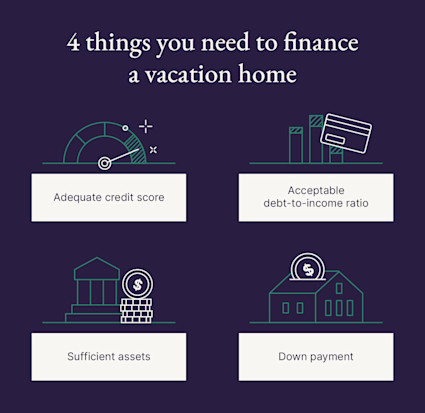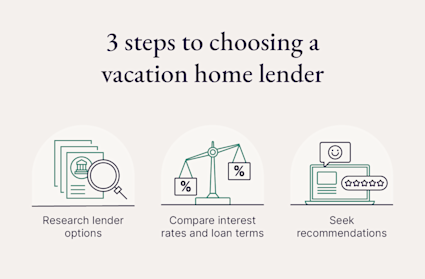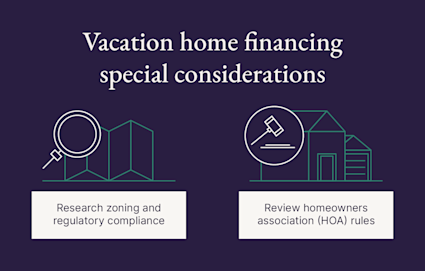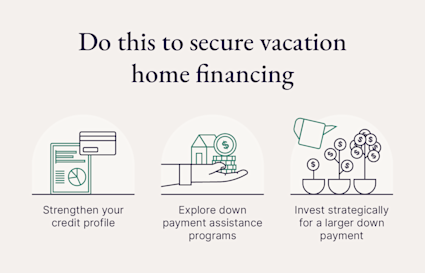Vacation home financing requirements

- Adequate credit score: Aim for a credit score of 620 or higher to qualify for the most favorable interest rates.
- Acceptable DTI ratio: A debt-to-income ratio of 45% or below demonstrates your ability to manage additional debt.
- Sufficient assets: Lenders consider your overall asset accumulation when determining whether you are eligible for a mortgage, especially for a luxury home.
- Down payment: Generally, lenders expect you to put down at least 10% of the home’s purchase price.
Necessary financial documents
Gathering the required documents streamlines the loan application process. Here's what you'll typically need.- Financial statements: Provide proof of income and employment, such as pay stubs and tax returns.
- List of monthly debts: Include existing loans, credit card balances and any other monthly obligations.
- Recent mortgage statements: If you own another property, include statements demonstrating responsible debt management.
Options for financing a vacation home
Understanding your financing options is crucial when applying for a vacation home loan. Here's a breakdown of some popular loan types.Traditional mortgages
A traditional vacation home mortgage typically requires a down payment of 10% or more. Traditional mortgages are a good option for borrowers with strong credit scores and access to a substantial down payment. Although this type of loan normally applies to a primary residence purchase, it can be an option for financing vacation homes.Fixed-rate mortgages
Fixed-rate mortgages provide peace of mind with a consistent monthly payment throughout the loan term. This level of predictability allows for easier budgeting as you'll know exactly how much your monthly second home mortgage payment will be, regardless of fluctuations in interest rates. This type of loan is one of the best vacation home financing options for those who prioritize stability and dislike the uncertainty of variable rates.Adjustable-rate mortgages
Adjustable-rate mortgages (ARMs) have a fixed interest rate for an initial period, then periodically “adjust” the rate on the outstanding balance. Lenders take on less risk during the fixed-rate introductory period. Compared to fixed-rate mortgages, an adjustable-rate mortgage can entice borrowers with its lower initial interest rate. This may be attractive if you plan to sell the property before the introductory period ends. However, the interest rate on an ARM adjusts periodically. These adjustments can significantly impact your monthly payment:- Index rate changes: Changes in the financial index used to adjust the interest rate, like the prime rate, directly impact your ARM's interest rate and potentially your monthly payment.
- Initial interest rate: The lower introductory rate on an ARM is enticing, but it's important to consider the length of the fixed-rate period. A shorter fixed period means your rate adjusts sooner, potentially exposing you to market fluctuations.
- Payment caps: ARMs often limit how much the monthly payment can increase or decrease with each adjustment. These caps can prevent drastic payment changes but also extend the loan term if the interest rate increases significantly.
VA loans
The Department of Veterans Affairs offers VA loans to eligible veterans and service members with favorable terms and often doesn’t require a down payment for a vacation home. VA loans are a fantastic benefit for veterans seeking to purchase a vacation home. Qualifying veterans can enjoy competitive interest rates, relaxed credit score requirements and the potential to skip the down payment altogether.Jumbo loans
Jumbo loans are designed for properties exceeding conforming loan limits set by government-backed entities like Fannie Mae and Freddie Mac. Jumbo loans come from private lenders and may have slightly higher interest rates than conforming loans. However, they cater to the luxury second home market, allowing you to finance that mountaintop or beachfront property.How to choose a lender for a vacation home

Research lender options
Explore interest rates, loan terms and fees offered by various lenders, including banks, credit unions and online lenders. The more options you consider, the better your chance of finding the most competitive deal.Compare interest rates and loan terms
Getting the first offer shouldn't be the end of the road. Compare the interest rates and loan terms from different lenders to find the one that aligns best with your financial goals and budget. Don't hesitate to leverage competing offers to get a better deal.Seek recommendations
Talk to real estate professionals, friends or family who have financed vacation homes. Their insights and referrals can be invaluable in helping you find a reputable and trustworthy lender with experience in vacation home financing. By comparing multiple lenders, you ensure you're getting the best rate and terms. Recommendations can also give you peace of mind, knowing you're working with a qualified lender who understands the unique aspects of vacation home financing.Legal and tax considerations

Research zoning and regulatory compliance
Ensure the property follows local zoning regulations. If you plan on renting out your vacation home for short-term stays, be aware of any restrictions on such rentals in the area.Review HOA rules
Familiarize yourself with any homeowners association (HOA) fees and regulations associated with the property. These fees can impact your budget and how you utilize the vacation home. Research HOA rules upfront to avoid any surprises down the road. Skipping either step could result in unexpected limitations on using your property and affect the ultimate cost of second home ownership.Tips for securing financing

Strengthen your credit profile
Demonstrate your financial responsibility by paying down debt, addressing errors on your credit report and aiming for a higher credit score. A strong credit score translates to better interest rates and loan terms. The better your credit score, the more favorable loan options you'll qualify for.Explore down payment assistance programs
Research down payment assistance programs that might be available to help you reach your down payment goals. These programs can significantly reduce the upfront financial burden of purchasing a vacation home, making vacation home ownership more accessible.Invest strategically for a larger down payment
Consider investing a portion of your savings to accumulate a larger down payment. This will improve your chances of loan approval and qualify you for more favorable loan terms, potentially lowering your monthly payments. A larger down payment can save you money in the long run through lower interest rates and potentially private mortgage insurance (PMI) avoidance.Financing vacation homes with Pacaso
You've successfully explored the essential steps to navigating vacation home financing. By understanding the requirements, loan options and key considerations, you can make your dream getaway a reality.However, for some, traditional vacation home ownership might not align with their lifestyle or financial goals. You'll need to consider the complexities of managing a property remotely, potential vacancy periods and ongoing maintenance costs. Pacaso offers a smart alternative: co-ownership of a turnkey vacation property. This approach allows you to enjoy the perks of vacation home ownership without the sole responsibility and associated costs. Pacaso handles everything from property management and maintenance to booking reservations, ensuring a hassle-free ownership experience.Vacation home financing FAQ
01: Is it hard to finance a vacation home?
Financing a vacation home can be more complicated than financing a primary residence. Lenders typically require higher credit scores, larger down payments and stricter debt-to-income ratios.
02: How much should you put down on a vacation home?
Generally, expect to put down at least 10% for a vacation home, but some lenders may require 20% or more. A larger down payment can improve your chances of approval and qualify you for better loan terms.
03: What’s the difference between financing a vacation home and a second home?
There isn't a strict legal difference between a vacation home and a second home. Lenders may use the terms interchangeably, although some loan options might have stipulations regarding how frequently you occupy the property.
04: Can you finance a vacation home with friends?
Technically, you cannot directly finance a property with friends through a single mortgage. However, you can split the down payment and closing costs and co-own the property outright. Alternatively, you could explore co-ownership through Pacaso.










